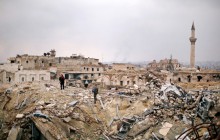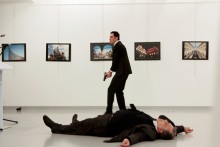The murder of the Russian Ambassador to Turkey, Andrei Karlov, at the opening of the photo exhibition “Russia as Seen by Turks” has drawn a contradictory response in the world.
It will be recalled that, as a result of the art gallery shootout, the Russian diplomat was seriously wounded and rushed to a hospital, where he died. According to the Turkish newspaper Daily Sabah, the killer is Mert Altintas who had graduated from the Izmir police academy in 2014 and was off duty during the attack.
According to an AP photographer, the attacker, who was dressed in black suit and tie, fired around eight shots. He shouted: “Don’t forget Aleppo, don’t forget Syria. Unless our towns are secure, you won’t enjoy security. Everyone who is involved in this suffering will pay a price. Only death will remove me from here. Everyone who has taken part in this oppression will pay for it one by one.” Indeed, the 22-year-old policeman did not come out of the art gallery alive. He was neutralized in the course of a police operation.
Western leaders have in fact unanimously condemned the assassination of the Russian ambassador, calling it an act of terrorism, while Russian President Vladimir Putin promised to increase the struggle against terrorism. “And the bandits will feel it themselves,” he emphasized in a characteristic peremptory tone.
Meanwhile, the Turkish pro-governmental media believe that the murder of Karlov was masterminded by Fethullah Gulen, a Turkish Islamic preacher who resides in the US and tries to destabilize the Russian-Turkish relations.
And the publication Karar, which also takes a pro-governmental stand, points out that the murder was committed on the eve of a “critically important meeting about Syria” in which Turkey, Russia, and Iran are supposed to take part.
The Western media are taking a somewhat different view of the events in Ankara. For example, The Times believes that the assassination of the Russian ambassador in Ankara is a test for the current Russia-Turkey relations. The newspaper says that the search for an external enemy and mistrust towards the US may bring Putin’s and Erdogan’s positions closer for some time, but, sooner or later, the two countries’ rivalry for leadership and influence in the region will come to the fore.
The Guardian says that Putin and Erdogan are likely to find common ground in their desire to blame third parties for the death of Andrei Karlov.
The reaction in Ukraine to the murder of the Russian ambassador, particularly, in social websites, was slightly different. For example, Foreign Minister Pavlo Klimkin tweeted: “Russia is responsible for the flagrant violations of human rights and the killings of thousands of innocent people in Syria and Ukraine. Of course, this does not justify killing the ambassador of one country in another. International law and human rights must be observed!”
Meanwhile, some Ukrainian politicians have focused on a different aspect of this event. For instance, Dnipro Mayor Borys Filatov has reacted to this tragic event as follows. “Assassinating diplomats is always a gross violation of international norms. But when the world turns a blind eye to somebody else’s sufferings and refuses to hear the entreaty of the sufferers, there will always appear a young, handsome, and self-sacrificing person who will remind the world of its meanness and slyness,” he wrote in Facebook. He also recalled Mykola Lemyk who killed a Soviet official in Lviv in 1933 to draw the world’s attention to the Holodomor. “Mykola departed this life in 1941. Gestapo men executed him… for Ukrainian nationalism,” Filatov stressed.
Will Putin achieve more?
His goal is to use the aggravated situation in Syria as a means to force all the main players to speak to the Kremlin
 The Day requested Serhii KORSUNSKYI, Ambassador at Large for Turkey and the Caucasus, to comment on the murder of the Russian ambassador, the impact this may have on Russia-Turkey relations and the overall situation in the region, and the conclusions Ukraine should draw from this.
The Day requested Serhii KORSUNSKYI, Ambassador at Large for Turkey and the Caucasus, to comment on the murder of the Russian ambassador, the impact this may have on Russia-Turkey relations and the overall situation in the region, and the conclusions Ukraine should draw from this.
“I would not overestimate the impact of this event on global processes. Of course, I knew the Russian ambassador very well. He arrived in Turkey when I was the ambassador there. Karlov was a typical Cold-War-era diplomat. He worked in North Korea for 17 years, a fact that speaks for itself. He firmly defended the Kremlin’s position: Crimea and the Donbas are theirs, and so on. We were on opposite sides of the barricades all through the Russian aggression.
“Naturally, it is absolutely inadmissible to kill an ambassador because diplomats are not armed. We have wars and battles of our own and must observe certain professional ethics and legal norms. For this reason, this assassination is a very bad signal, but it fully fits in with the overall atmosphere around the events in Aleppo and Syria as a whole. The media have been actively spotlighting all this, stressing in particular that it is Assad’s troops and the Russians that kill defenseless children and civilians. So it is not ruled out that this young man’s action was just an isolated emotional outburst. On the other hand, some of the Turkish media presume that this man might be the follower of Gulen. Accordingly, this is a continuation of the July 15 mutiny and a step aimed at thwarting the Turkish-Russian rapprochement. I think it is too early to speak of this as of a fact. But this is not ruled out.
“At the same time, I don’t think this will affect the relations between Turkey and Russia. For it is obvious in this case that Turkey’s official authorities could not have possibly orchestrated this murder. It is undoubtedly an act of terror. I have no doubt that the Turks will find somebody to punish very soon. They have already arrested his relatives, know his life story, and are taking certain steps – together with the Russians, of course.
“As for parallels between the assassinations of Karlov and Aleksandr Griboyedov, the Russian media have reported that Putin planned to watch Griboyedov’s Woe from Wit at the Maly Theater on that very day. It is a fantastic karma of sorts: Griboyedov was the ambassador to Iran and he was killed in Teheran in 1829. As Moscow was going to host negotiations between Turkey, Russia, and Iran, the Russian ambassador was suddenly killed for the first time in Ankara.”
Incidentally, do you share the opinion of the German newspaper Frankfurter Allgemeine Zeitung which says in the article “Geopolitics: the Winner’s Name Is Putin” that the Russian leader’s hope for the fall of Aleppo has come true and the victory in Syria is not the only success of Putin this year?
“We are clearly aware of what Putin’s original goal was, when he meddled in the Syrian war. He does not care about either Syria or Assad. His goal is to force all the main players to speak to the Russians by taking advantage of the incredible problem of refugees, which worries the EU, the aggravated situation around Syria and the war against ‘Islamic State,’ which worries the US, and the Kurdish problem which worries Turkey. They succeeded in this. Indeed, everybody began to sit down at the negotiating table and discuss with them what is to be done with Syria. But here it is all too clear: withdraw your troops and things will normalize.
“The remaining question is whether Putin will achieve more, for he hoped that sanctions would be lifted and NATO and the EU would crumble. It is quite obvious that while Turkey and the US are seriously interested in stopping the Syria war, Putin is interested in the opposite. How can one reach a compromise on these grounds? I don’t think he will achieve his goal, and, after all, these steps must be assessed from the juridical angle. As an American observer said, ‘we are grieving over the murder of Russia’s ambassador in Ankara, but what about the thousands of civilians killed with Russian assistance?’”
CONCLUSIONS FOR UKRAINE
“We should proceed from our own pragmatic interests in the relations with Ankara. We must not lose Turkey which was, incidentally, a cosponsor of the UN GA resolution on Crimea. In other words, despite the rapprochement with Russia, Turkey is on our side, as far as protection of human rights in Crimea is concerned.
“The Turkish Republic is our commercial and political partner, and we are also developing military-technical cooperation. We must be able to take pragmatic steps and set a positive agenda which would let us move on. As for the rapprochement between Ankara and Moscow, I will be judging by deeds, not by words, owing to my Turkish experience. Let us wait and see what practical steps Turkey and Russia will take in the context of this rapprochement. Not a single problem – Syria, gas price cuts, cancellation of visas on Russia’s part – has been solved as of today. In other words, all this so far remains as declarations on paper. All we have to do now is resist to falling easy prey to political provocations in the press and on the part of Russia.”









